| ||
16 seats to the European Parliament | ||
|---|---|---|
European Parliament elections were held in Denmark on 10 June 1999 to elect the 16 Danish members of the European Parliament.
| ||
16 seats to the European Parliament | ||
|---|---|---|
European Parliament elections were held in Denmark on 10 June 1999 to elect the 16 Danish members of the European Parliament.
Seats were allocated first by the D'Hondt method to electoral coalitions (Venstre + Conservative People's Party + Centre Democrats; June Movement + People's Movement against the EU) and the remaining parties by themselves; then subsequently between the parties in each coalition.
| Party | Votes | % | Seats | +/– | |
|---|---|---|---|---|---|
| Venstre | 460,834 | 23.39 | 5 | +1 | |
| Social Democrats | 324,256 | 16.46 | 3 | 0 | |
| June Movement | 317,508 | 16.11 | 3 | +1 | |
| Danish Social Liberal Party | 180,089 | 9.14 | 1 | 0 | |
| Conservative People's Party | 166,884 | 8.47 | 1 | –2 | |
| People's Movement against the EU | 143,709 | 7.29 | 1 | –1 | |
| Socialist People's Party | 140,053 | 7.11 | 1 | 0 | |
| Danish People's Party | 114,865 | 5.83 | 1 | New | |
| Centre Democrats | 68,717 | 3.49 | 0 | 0 | |
| Christian People's Party | 39,128 | 1.99 | 0 | 0 | |
| Progress Party | 14,233 | 0.72 | 0 | 0 | |
| Total | 1,970,276 | 100.00 | 16 | 0 | |
| Valid votes | 1,970,276 | 97.38 | |||
| Invalid/blank votes | 53,030 | 2.62 | |||
| Total votes | 2,023,306 | 100.00 | |||
| Registered voters/turnout | 4,009,594 | 50.46 | |||
| Source: Ministry of the Interior [1] | |||||
| Main apportionment | ||||
|---|---|---|---|---|
| Letter | Electoral alliance/party outside of electoral alliance | Votes | Quotients | Seats |
| A | Social Democrats | 324,256 | 3.24 | 3 |
| B | Danish Social Liberal Party | 180,089 | 1.80 | 1 |
| CDV | Conservative People's Party/Centre Democrats/Venstre | 696,435 | 6.96 | 6 |
| F | Socialist People's Party | 140,053 | 1.40 | 1 |
| JN | June Movement/People's Movement against the EU | 461,217 | 4.61 | 4 |
| O | Danish People's Party | 114,865 | 1.15 | 1 |
| Q | Christian People's Party | 39,128 | 0.39 | 0 |
| Z | Progress Party | 14,233 | 0.14 | 0 |
| Divisor: 100,000 | ||||
| Alliance 1 | ||||
|---|---|---|---|---|
| Letter | Party | Votes | Quotients | Seats |
| C | Conservative People's Party | 166,884 | 1.85 | 1 |
| D | Centre Democrats | 68,717 | 0.76 | 0 |
| V | Venstre | 460,834 | 5.12 | 5 |
| Divisor: 90,000 | ||||
| Alliance 2 | ||||
|---|---|---|---|---|
| Letter | Party | Votes | Quotients | Seats |
| J | June Movement | 317,508 | 3.18 | 3 |
| N | People's Movement against the EU | 143,709 | 1.44 | 1 |
| Divisor: 100,000 | ||||

The European People's Party Group is a political group of the European Parliament consisting of deputies (MEPs) from the member parties of the European People's Party (EPP). Sometimes it also includes independent MEPs and/or deputies from unaffiliated national parties. The EPP Group comprises politicians of Christian democratic, conservative and liberal-conservative orientation.
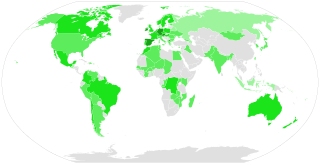
A green party is a formally organized political party based on the principles of green politics, such as environmentalism and social justice.
The Swedish People's Party of Finland is a Finnish political party founded in 1906. Its primary aim is to represent the interests of the minority Swedish-speaking population of Finland. The party is currently a participant in the Government of Petteri Orpo, holding the posts of Minister of Education, Minister for European Affairs, and Minister of Youth, Sport and Physical Activity.
The Conservative People's Party, also known as The Conservatives is a centre-right political party in Denmark. The party is a member of the International Democracy Union and the European People's Party.

The 2004 European Parliament election was held between 10 and 13 June 2004 in the 25 member states of the European Union, using varying election days according to local custom. The European Parliamental parties could not be voted for, but elected national parties aggregated in European Parliamental parties after the elections.
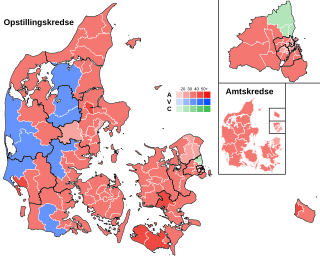
European Parliament elections were held in Denmark on 13 June 2004 to elect the 14 Danish members of the European Parliament. The opposition Social Democrats made major gains, mainly at the expense of Eurosceptic parties such as the June Movement.
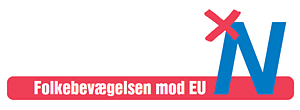
The People's Movement against the EU is a far-left political association in Denmark against the European Union. It was founded in 1972 as a cross-party campaign platform for a 'no' vote in Denmark's referendum on EEC membership. The People's Movement was represented in the European Parliament from 1979 until 2019, when it lost its single seat in the European Parliament election.

The political groups of the European Parliament are the officially recognised parliamentary groups consisting of legislators of aligned ideologies in the European Parliament.

Elections in Portugal are free, fair, and regularly held, in accordance with election law.

Jens-Peter Rossen Bonde was a Danish politician who served as Member of the European Parliament (MEP) with the June Movement. He resigned as an MEP in May 2008. Bonde was elected to the European Parliament in the first election in 1979 with the People's Movement against the EU. He was re-elected 6 times consecutively. In 1992 he co-founded the June Movement which he chaired until his retirement in May 2008.
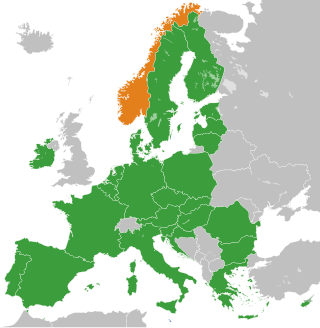
Norway is not a member state of the European Union (EU). However, it is associated with the Union through its membership in the European Economic Area (EEA), signed in 1992 and established in 1994. Norway was a founding member of the European Free Trade Association (EFTA) in 1960, which was originally set up as an alternative to the European Economic Community (EEC), the main predecessor of the EU. Norway had considered joining both the EEC and the European Union, but opted to decline following referendums in 1972 and 1994. According to the European Social Survey conducted in 2018, 73.6% of Norwegians would vote 'No' in a referendum to join the European Union. Norway shares land borders with two EU member states, namely Finland and Sweden, and maritime borders with a third, Denmark.

Early parliamentary elections were held in Ukraine on 30 September 2007. The election date was determined following agreement between the President Viktor Yushchenko, the Prime Minister Viktor Yanukovych and the Chairman of the Verkhovna Rada Oleksandr Moroz on 27 May 2007, in an attempt to resolve the political crisis in Ukraine triggered by the 2 April 2007 presidential decree on dissolution of Ukraine's parliament.
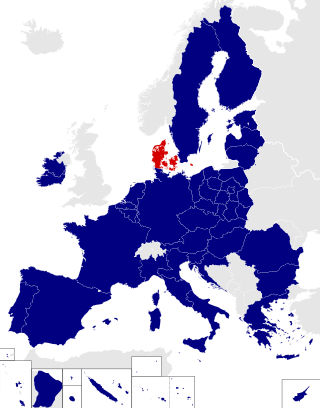
Denmark is a European Parliament constituency for the elections to the European Parliament covering the Member state of the European Union Denmark, but not other parts of the Danish Realm such as the Faroe Islands or Greenland, which are not a part of the EU. It is currently represented by fifteen Members of the European Parliament. Denmark uses the D'Hondt method of proportional representation. Electoral alliances between two or more parties are allowed.

European Parliament elections were held in Denmark on 15 June 1989 to elect the 16 Danish members of the European Parliament.

European Parliament elections were held in Denmark on 9 June 1994 to elect the 16 Danish members of the European Parliament.
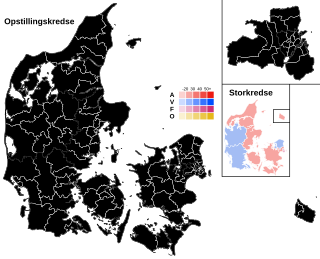
European Parliament elections were held in Denmark on 7 June 2009 to elect the 13 Danish members of the European Parliament. The election was held simultaneously with a referendum on changing the Danish Act of Succession.
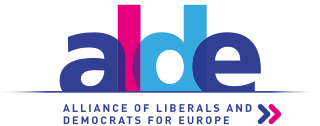
The Group of the Alliance of Liberals and Democrats for Europe was the liberal–centrist political group of the European Parliament from 2004 until 2019. It was made up of MEPs from two European political parties, the Alliance of Liberals and Democrats for Europe Party and the European Democratic Party, which collectively form the Alliance of Liberals and Democrats for Europe.

Morten Messerschmidt is a Danish politician and since 2022 leader of the Danish People's Party. He was an elected Member of the Folketing at the 2019 Danish general election having previously served from 2005 to 2009. At the 2014 European Parliament election, he was elected a Member of the European Parliament for Denmark with 465,758; the highest number of personal votes ever cast at a Danish election.

The politics of Denmark take place within the framework of a parliamentary representative democracy, a constitutional monarchy and a decentralised unitary state in which the monarch of Denmark, King Frederik X, is the head of state. Denmark is a nation state. Danish politics and governance are characterized by a common striving for broad consensus on important issues, within both the political community and society as a whole.

The 2019 European Parliament election in Denmark was held on 26 May 2019, and elected the Danish members to the European Parliament. The elections are part of the EU-wide elections for the parliament. Denmark had 13 seats in parliament, which increased by one additional seat following Brexit.